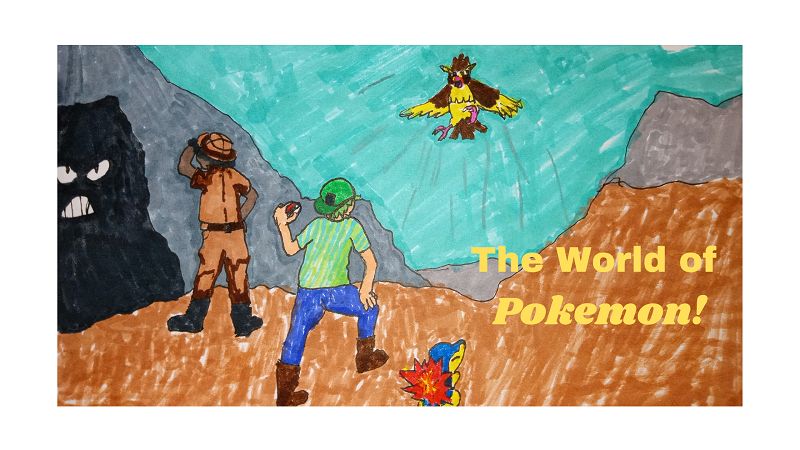
Learning with Pokémon: How the Popular Game Can Teach Important Skills
Is Pokemon educational?
Many would say no, with its flashy monsters and pretend world, one could think you wouldn’t learn much from a company trying to sell as many cards and toys as possible. However, as I talked about in my last article, the world of Pokemon is so much more complex. It’s not just the products, rather, the love and care that goes into designing and making the Pokemon universe gives the experienced trainers and excited young fans alike a glimpse into a fun wonderful world with lots of life lessons to share. From basic life skills, to advanced strategy, and even processing complex emotions, Pokemon gives people everywhere a chance to learn and grow, then take those lessons out into the world around them.
The Pokemon Game teaches strategy
One of the first things the games and cards teach you is strategy. Whether it’s building the perfect deck or making sure your team has the right type-matchups. Pokemon have different types that determine what kind of attacks they can do. For a simple example, Water types are strong against Fire types, or for a complex example, Psychic types are weak to Bug and Ghost types because those are common fears. Pokemon is always encouraging young trainers to optimize and strategize their teams. As different gym leaders in the video games and decks from other players require different skills and type matchups to overcome, so too does the player have to adapt their team and strategies to take down these opponents. There’s puzzles, riddles, and secret stories within the Pokemon world that challenge the mind and encourage problem-solving and deduction skills. You can learn money-management and preparation skills by choosing what items to buy at stores to make sure you have the supplies you need. And if you lose, you end up right at the last Pokemon Center with the opportunity to try again with better knowledge on what to take with you. There are complex stats that can be ignored while playing the games and cards while still giving you a well-rounded game experience, but others choose to implement math strategies and statistics into their gameplay to get an edge on the competition.
Pokemon teaches players how to handle and learn from failure
Another thing pokemon teaches you how to do is handle failure. Often the trainers you face in games will lose with grace and poise, stating how this experience has taught them to improve their own battles. As well, the player will probably lose throughout the game, and just as quickly they’re encouraged to get back up and try again. Often the opponent you lost to will give you helpful advice. Your team will grow as you do, each Pokemon getting stronger as you discover new strategies and overcome difficult challenges. With such an emphasis on winning and success placed on many kids, this mindset can be refreshing. After all, it’s often through failure that people learn the tools and skills they need to be successful.
Pokemon shows the power of empathy and kindness
Pokemon very strongly focuses on empathy, imploring you to take care of your Pokemon and form bonds with them, and care for the other trainers around you even if they are your rivals. The games track your friendship based on how much you care for and interact with your Pokemon. The show always has the trainers and their Pokemon communicating and working together, even if a Pokemon can’t speak with words. There’s a strong emphasis on the consent of the Pokemon as well, showing that these Pokemon battle and train because they want to, and you should listen to their input when working together.
Story Time: The Old Man and the Scatterbug
This next story is going to be a personal story again, since it resonated with myself and others so strongly. In the Pokemon X and Y videogame, you encounter a lonely old man. He tells you how he’s been lonely since his wife died, and how he wants a small Pokemon to be a friend and companion, but can’t go out to catch one himself. When I met him, I looked through the Pokemon I had caught and gave him a small Scatterbug, a caterpillar-like Pokemon that I was not particularly fond of and certainly didn’t mind parting with. Despite my urgency to adventure, I felt the call to return and check in on him regularly, eager to see how my new friend was doing. While he was certainly happy, he asked every time if I wanted my Scatterbug back, since it was my pokemon. Each time I declined, just happy to see the two happy, and enjoyed visiting him even if he repeated the same chat line every time. After I had become the Pokemon Champion of the region, effectively beating the game, I went to visit him to see if his character had anything new to say. I walked into an empty house, there was no furniture and the walls were bare. In the center of the room was a Pokeball with Scatterbug inside, and a note attached to the outside. The old man wrote to me, thanking me for leaving Scatterbug with him so he could spend his final days happy, and gifting me a comet shard. Scatterbug was waiting inside the pokeball, holding the shard. Comet shards are often sold to earn extra cash in the games without a second thought, but I couldn’t bring myself to part with it. I even trained Scatterbug, watching it evolve into a beautiful Vivillon, no longer a caterpillar but now a gorgeous butterfly. It still holds that comet shard to this day. Empathy, love and care, even death and sorrow were broached. I cried, sad to see my friend go, but happy I met him. I could have passed this character, never talked to him, and have him disappear from my game without knowing he existed, but I’m so happy I didn’t.
Pokemon explores important subjects like loss and grief
Death is not something the shows, games, or Pokemon themselves have ever shied away from, and it’s a topic they handle with grace and empathy every time. There are even Pokemon that are ghosts, graveyards where people mourn and visit their loved ones- people and Pokemon alike, and the show has a few episodes that touch on the topic. To handle it in a way that’s appropriate, respectful, and helpful to young children allows us to become more comfortable approaching this difficult part of life when the need arises.
Collecting and trading cards helps kids understand money and value
Those who collect the cards usually spend a good deal of time trading those cards with others as well. For young kids still learning about money, trading and purchasing, and conversation, this can open a whole new set of skills. Learning to compromise and barter can be tough, but the motivation of completing a set or getting your favorite Pokemon can encourage children to tackle these skills and engage their peers. They learn about sentimental value- a card not worth much money or that is not as rare may still be valuable to someone if they like the art, or the particular pokemon on the card, or if its abilities in the game are just what they need to complete their deck. They may learn to use tools like the internet or guidebooks to figure out how much their cards can be worth before trading with others. These values can teach them about fairness as well. Unfortunately, they may even learn about scams and those willing to take advantage of them. Most people who played Pokemon have a memory of an older kid on the playground convincing them to trade a good card for a basic card, or getting cards from a sketchy-looking pack and finding out the cards are fake. Pokemon cards are popular, and when things are popular, fakes and scams are always out there. It’s important to learn about them, and Pokemon cards are a great low-risk area to learn these important life lessons.
These examples are only the tip of the iceberg. You’re taught responsibility, taking care of these Pokemon and yourself all on your own. They teach you to explore, with secrets hidden around every corner, encouraging future scientists to interact with the world around them and contribute to the study and learning of others. After all, that’s why they sent you out to fill your first Pokedex in the first place, to study the beautiful, scary, wonderful world of Pokemon. Trainers rarely make it alone, you’re encouraged to make friends and grow a network of contacts. No matter your age, there are plenty of things to learn, and Pokemon challenges you to work hard for what you love. These lessons may be subtle, hidden behind gameplay and storytelling, but the impact they leave behind is far louder. With luck, Pokemon will continue this legacy of kindness and growing for many years to come, and I hope to be along for the ride for all of it.
Written with love by Ross Grenier, former Pokemon Kid, current Pokemon Master.

